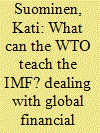| Srl | Item |
| 1 |
ID:
146201


|
|
|
|
|
| Summary/Abstract |
This article examines the trade effect of flexibility design features within preferential trading arrangements (PTAs). Using a gravity model of bilateral trade that incorporates multilateral trade resistance, we report three main results. First, unconstrained escape provisions undermine the effectiveness of PTAs when it comes to increasing trade. Second, adding some restrictions to these escape provisions more than offsets the negative effect of unconstrained escape, leading to more effective PTAs than those without escape options. Third, adding more restrictions beyond a certain point serves only to make PTAs less effective. Thus, both too much institutional flexibility and too much institutional rigidity reduces the ability of PTAs to promote trade. However, fitting these results to the descriptive data makes it appear that most PTAs would be even more trade effective if they included greater restrictions on the use of their escape provisions. Consequently, it appears that policymakers generally choose fewer escape restrictions than would be optimal in terms of trade performance.
|
|
|
|
|
|
|
|
|
|
|
|
|
|
|
|
| 2 |
ID:
018070


|
|
|
|
|
| Publication |
Autumn 2000.
|
| Description |
775-808
|
|
|
|
|
|
|
|
|
|
|
|
|
|
|
|
| 3 |
ID:
117710


|
|
|
|
|
| Publication |
2012.
|
| Summary/Abstract |
Despite rising back to prominence during the global economic turmoil, the International Monetary Fund remains under severe pressure over its lack of legitimacy and effectiveness. It is surrounded by increasingly vibrant and potentially competing systems of regional financial arrangements. But while it is feared that regional arrangements can undermine the global financial order, they can also help buttress the multilateral institutions that are struggling to manage an increasingly complex global economy. The purpose of this article is to draw on trade, exploring the decades-long efforts to ensure compatibilities between regional trade agreements and the multilateral trading system, to offer lessons to financial policymakers.
|
|
|
|
|
|
|
|
|
|
|
|
|
|
|
|